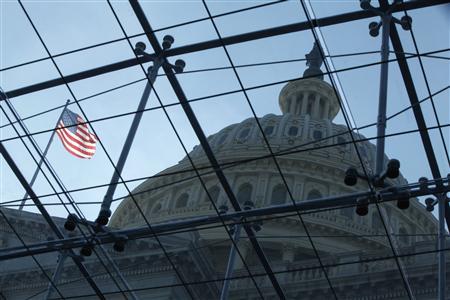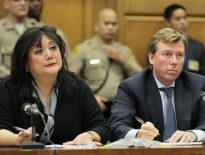(Reuters) – With the U.S. government shutdown in its second day on Wednesday and no end in sight, a worrisome reality is sinking in on Capitol Hill: The standoff is merging with a much more complex fight in mid-October over raising the federal debt limit.

“We think the issues are converging,” Republican Representative Paul Ryan, chairman of the House Budget Committee, told reporters on Wednesday.
Ryan, last year’s Republican vice presidential candidate, sees the development as positive, forcing two deadlocked adversaries to come to the negotiating table in the face of a bigger threat than a partially shut-down government
But it could mean the shutdown will not end until the middle of October.
More significantly, the result could be a dangerous and unpredictable fiscal superstorm that may be harder to resolve than the shutdown alone or the 2011 debt limit struggle that sent Financial markets plummeting and brought the United States to the brink of default.
The central problem is that congressional Republicans view the debt ceiling as their best chance to negotiate concessions from President Barack Obama, while at the same time, Obama says he will not negotiate around the debt ceiling, as he did in 2011.
That alone is a recipe for stalemate.
The time frame is equally daunting. The government’s $16.7 trillion borrowing cap must be raised by October 17.
Finally, Republicans aim to bring new demands to negotiations that already have deadlocked over Republican efforts to derail or curtail Obama’s signature healthcare law, known as Obamacare.
Beyond Obamacare, Republicans have talked about seeking concessions on tax reform, approval of the Canada-to-Texas Keystone XL oil pipeline, a reduction in “sequester” spending cuts on the military along with a long wish list of other Republican priorities.
“I think there will be an even bigger list when it comes to the debt ceiling,” said Representative John Fleming, a Louisiana Republican. “We’re going to be talking about the Keystone XL pipeline, movement of cuts into entitlement reforms, beginning to adjust sequester,” and more.
‘REALLY MESSY’
“This just gets really messy,” said Sean West, a political risk analyst with Eurasia Group in New York. “The parties are now literally at war with each other.”
Representative Peter King of New York, a moderate Republican, said he was concerned that conservative Tea Party Republicans might be tempted to push the envelope too far when it comes to the debt ceiling.
“I’d be very concerned,” he said, adding, “I don’t even know if they realize the impact of what it means to default.”
Democratic Representative Louise Slaughter of New York said she was worried about a damaging fight over the debt limit and believed Republicans might be reckless enough to risk such harm.
“The worst thing they could do, obviously, is to challenge the full faith and credit of the United States of America,” she told Reuters in an interview.
But Republicans think they have greater leverage on the debt ceiling because the consequences of default are so much more severe than a government shutdown.
A first-ever U.S. default on debt or other payments could trigger a massive drop in global stock markets, push up borrowing costs sharply and cause businesses to stop hiring and consumers to stop spending, grinding the economy to a halt, analysts say.
During the 2011 fight that skirted default by a day or two, the blue-chip stocks in the Dow Jones industrial average fell some 17 percent and the United States lost its top-tier Standard and Poor’s credit rating. The episode cost the Treasury $1.3 billion in higher interest costs that year, according to a government study.
Some hope the fear factor might help bring the sides together. Markets can “have a pretty powerful impact, a sobering impact in getting people around the table and finding some common ground,” said Oklahoma Representative Tom Cole, a close ally of House of Representatives Speaker John Boehner.
Republicans also say the debt limit consequences are big enough that Obama cannot continue to avoid negotiations with them.
“The government’s shut down, but the debt ceiling could shut the economy down,” said Representative Marlin Stutzman, a conservative Republican from Indiana. “I wish the president was concerned enough that he would start talking about this now. An executive can’t sit on the sidelines when there are big differences like this.”
The debt ceiling will be “the forcing action to bring us -the two parties – together,” Ryan said. “Our goal and motivation here is to get a budget agreement, and we think this is a way to do that.”
BIGGER CONSEQUENCES
It may take several days for any backlash from the shutdown of federal agencies, parks and services to build up to the point to motivate lawmakers into a deal to restore government funding. Many House Republicans regard it as a temporary inconvenience for Washington bureaucrats. Up to a million federal workers across the country have been forced to take unpaid leave because of the shutdown.
Obama was meeting on Wednesday with congressional leaders from both parties at the White House for the first time since the shutdown started on Tuesday, but a Senate Democratic aide said not to expect any breakthroughs.
A White House official said Obama would repeat his demands that Congress restore government funding and raise the debt limit without conditions.
Another complication is Boehner’s inability to control his own caucus, where conservatives allied with the conservative Tea Party movement are driving much of the agenda.
Now that much of the government is closed, Eurasia Group’s West said it may be in Boehner’s interest to drag out the fight to build credibility among conservatives and get to the debt ceiling.
Added Greg Valliere, chief political strategist at Potomac Research Group, “I wish I could be optimistic, but I think we come right to October 15 or 16 without a deal.”
(Editing by Fred Barbash and Peter Cooney)





